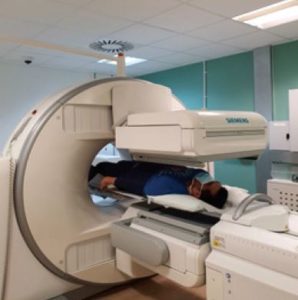Download and print as a PDF (150kB pdf)
On this page
- What is a bone scan?
- Can I have a bone scan if I am pregnant?
- Can I have a bone scan if I am breastfeeding or chest/bottle-feeding?
- Can I have a bone scan if I am on dialysis?
- Can I bring someone with me?
- What will happen at my appointment?
- What happens after my appointment?
- When will I get my results?
- Are there any risks?
- Contact details
What is a bone scan?
Your bones are living tissue. Bones continually remodel themselves to help repair any damage.
A bone scan will show your doctor how your bones are working and will show any conditions that are different from normal.
There is no preparation required for this scan.
Can I have a bone scan if I am pregnant?
If there is a possibility that you are pregnant, please inform the department before your appointment, as your appointment may need to be postponed. The risk to your baby from this radiation exposure is low.
Can I have a bone scan if I am breastfeeding or chest/bottle-feeding?
Please inform the department before your appointment if you are currently breastfeeding or bottle-feeding your breastmilk to your child, as you may need to pause for a few hours.
If you are currently chestfeeding or bottle-feeding your child formula milk please inform the department before your appointment, as you may need to pause for a few hours.
Can I have a bone scan if I am on dialysis?
Please inform the department if you are on any form of dialysis, as it may be necessary to co-ordinate your nuclear medicine appointment with your dialysis treatment.
Can I bring someone with me?
Whenever possible, you should attend your appointment alone, unless you need a carer to support any additional needs. If you need a carer, or you provide care for someone else involving close contact, please inform the department before your appointment, as you may need to keep a distance of 1 metre from them for a few hours.
What will happen at my appointment?
When you arrive for your appointment, you will firstly be given a small injection of a radioactive liquid into a vein, usually in your arm or the back of your hand. This injection should not have any effect on you, but will allow us to take images of your bones using a gamma camera.
Occasionally we will need to take some initial images immediately after the injection. These will take approximately 15 minutes.
The bone scan will be carried out three hours after the injection. In the time between the injection and scan you may leave the department and participate in any normal activities, but we ask that you drink plenty of fluid and empty your bladder frequently.
When you return for the scan, you will be asked to remove any metallic objects, such as a phone, belts, keys, underwire bra, coins or zips. You may also be asked to change into a gown.
The scan involves you lying still on your back on the imaging bed, with a gamma camera positioned above and below you, but open at both sides.
For a whole body scan, the cameras will start over your head and slowly move down your body, which will take about 25 minutes.

You may need images over a specific part of the body which might include a 3 dimensional (3D) look at that area. For this we use a SPECT/CT scanner.
You will be required to stay still for the duration of each part of the scan. Once the scan has been completed the images will be checked. Occasionally, there is a need to repeat some images or obtain additional ones.
If you have young children or pregnant friends / family please limit close contact with them for the rest of the day. You can be in the same room but avoid sitting close to each other for long periods. This is to avoid them receiving any unnecessary radiation exposure.
What happens after my appointment?
Eat as normal and keep well hydrated.
To protect other people from radiation, plan to keep a distance of at least 1 metre until the end of the day. This is long enough for some of the radioactivity to decay and for your body to remove the rest. Brief close contact such as queuing or walking past others is safe. Remember to use good hygiene precautions during this time to prevent contamination.
When will I get my results?
The report will be sent to your referring doctor. They will contact you to discuss the results. If you have any enquiries regarding your results please contact the department where the referral was originally made
Are there any risks?
The radioactive tracer administered will expose you to a small amount of ionising radiation. The risks of this are very low and the benefits of having the results from the bone scan greatly outweigh the risk.
Contact details
Royal Sussex County Hospital (RSCH)
Nuclear Medicine Department Louisa Martindale Building
Royal Sussex County Hospital
Eastern Road
Brighton BN2 5BE
01273 696955
Ext. 64381 or 64382
Princess Royal Hospital (PRH)
Princess Royal Hospital
Imaging Department
Nuclear Medicine Department
Lewes Road
Haywards Heath
West Sussex
RH16 4EX
Phone
01273 696955
Ext. 64381 or 64382
This information is intended for patients receiving care in Brighton & Hove or Haywards Heath.
The information here is for guidance purposes only and is in no way intended to replace professional clinical advice by a qualified practitioner.